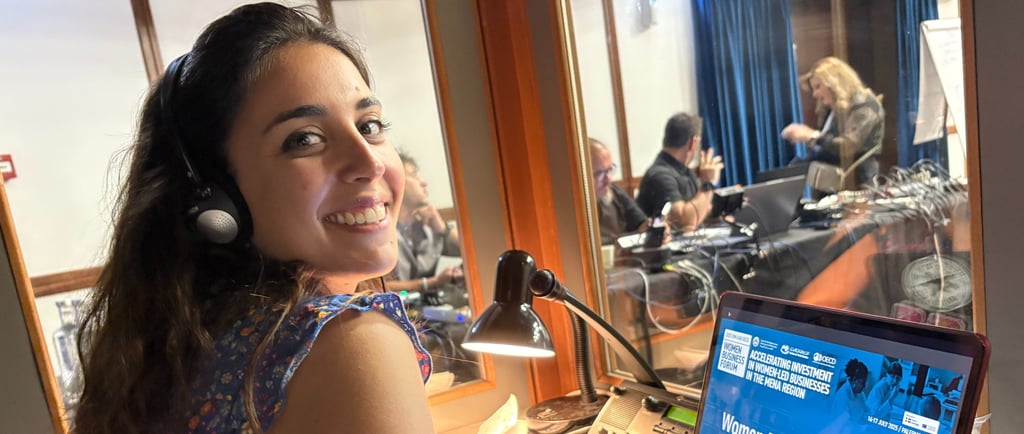
Facing the Unknown: How I Learned to Turn Interpreting Anxiety into an Ally
Article
Flaminia Munafo
8/4/20256 دقيقة قراءة



“Be strong then, and enter into your own body; there you have a solid place for your feet. Think about it carefully! Don’t go off elsewhere! Kabir says this: just throw away all thoughts of imaginary things, and stand firm in that which you are.”
Welcome to freelancer’s life: a door that opens a black tunnel into Alice in Wonderland.
It’s exactly like a trip. You can either like it or not — that’s up to you. Maybe you learn how to like it during the journey, but until then, exactly like a montagna russa or a crazy wave from the Pacific Ocean, you need to know how to stay calm and focused while riding it.
I still remember the first time I entered a booth: I was 19 years old and working as an assistant during a conference on Human Rights in a prestigious hotel in Rome. I watched professional interpreters walk in with their bags, settle in, do their job as if it were a simple daily task — like brushing their teeth — and then end their day. I was stunned, thinking constantly: One day I will be there.
And here I am now, after 8 years doing this job, still feeling enthusiastic and happy to do what I love. Nevertheless, I still face the ups and downs of the freelancer’s lifestyle — especially in a country like mine, Italy, where you have to work your ass off to be respected and to grow; it’s not something you can take for granted.
More than the challenge of “What topic will I interpret today?” or “Will I be able to convey what the speakers say in the best way possible?” or even “Will I be enough?”, what really affects my mind is: “Will there be assignments this month?”
Turning Downtime into an Ally
One of the most challenging forms of anxiety for freelancers is not the stress of performing, but the uncertainty of when you’ll next get to perform at all. The empty calendar days can feel heavier than a packed booth schedule. I’ve learned to reframe these moments: instead of seeing them as wasted time, I treat them as a gift of space. This is when I update my glossaries, study a new subject, improve my language skills, or experiment with new interpreting techniques. Sometimes I take an online course on a completely different topic — history, technology, even cooking! — because curiosity sharpens the mind in unexpected ways. That way, when the next assignment arrives, I’m not only rested but also richer in knowledge and confidence.
Practice and experience slowly help you overcome self-sabotage, as you grow more confident and familiar with people, topics, and situations. You also learn how to be less strict with yourself, and instead of struggling for perfection, you become more aware of your qualities and flaws — and create the best recipe to make them work together into the best possible piece of cake.
What you can’t control, though, is the actual workflow, especially at the beginning of your career, and above all now, in a world where clients are more focused on quantity rather than quality, preferring to pay less and sometimes assign the job either to someone who’s not a professional or, even worse, to artificial intelligence.
I’m still among those who believe there is nothing better than a human touch, especially when it comes to communication. As interpreters, we work with people, for people, and as people.
This article, though, is not about the never-ending debate on AI. It’s about something deeply human instead: dealing with emotions and feelings in a healthy way.
Probably many years of yoga and meditation have given me the right tools to manage — or at least try to manage — this feeling in the best possible way. Many leadership coaches also speak about growing through mistakes and dark moments, so here I want to share with you today some tips that I hope will be useful.
Recognising Anxiety
The first step, even though it might seem unintuitive, is acceptance.
Once you are aware that behind your reactions there is a feeling of anxiety, you’ve done 80% of the job. You can then take more steps forward and, most probably, deal with the root of the problem.
There are many techniques to deal with anxiety: I personally think breath-work is one of the best. The trick is simple: if you can focus on one thing at a time, your mind calms down — and so does your body. Once both are calmer, every challenge feels just a little lighter on your shoulders.
The simple, humble task of inhaling and exhaling is one of the most ancient practices used to focus and steady the mind. If you train yourself to do it regularly, you can always return to this technique whenever you feel confused, tired, or overwhelmed.
Over the years, I’ve learned that anxiety is not the enemy. It’s a signal. It tells me I care, that I’m alert, that my mind is gearing up for something important. Instead of suppressing it, I try to acknowledge it: You’re here. Let’s work together.
Preparation Is My Anchor
Of course, acknowledging emotions and knowing how to handle them in the moment is not the only piece of the puzzle. Preparation is equally important, as it supports your focus and sense of self-worth by reassuring you that you’ve done your best to perform well.
Preparation is my way of shaking hands with the unknown. Before a conference, I always build a glossary, research the speakers, and even watch YouTube lectures on the event’s topic. Did I know everything? No. But I had a framework to lean on. And that, in moments of uncertainty, is priceless.
AI can be a great ally here. Years ago, I would read countless articles, interviews, and documents, and still not find the right terminology. Now, ChatGPT can work as my personal assistant — researching for me, or even simulating a possible dialogue I can use to practice simultaneous or consecutive interpretation at home.
Flexibility: The Secret Ingredient
This is another great lesson I learned from yoga: you need to be strong and resilient in life, but also flexible enough to adapt to the unknown. Because, you know what? The only certainty in life is doubt.
When you spend hours working in a booth — hopefully with a nice colleague! — your body and mind inevitably get tired as the day goes on. And often, just when you’re about to switch off, a speaker decides to make a joke. Without considering that you have less than 3 seconds to understand it — maybe even laugh at it — reformulate it, and deliver it so that the audience laughs too. They probably also forget that humour is culturally determined, so it might not work at all in the target language.
Once this happened to me. It was one of my first times interpreting in a booth outside my university, and suddenly a Spanish speaker made a joke that simply wouldn’t make any sense in Italian. I literally had 3 seconds to find a solution, and I didn’t — or at least I thought so. I just held the microphone and said: “Guys, the speaker is making a joke that I can’t translate into Italian, I’m sorry. But I still need to be paid today, so please laugh and make him think it was funny.” The audience laughed sincerely, and I realised I had found the solution simply by not sticking to the literal content, but instead turning the problem around with flexibility. Once again, the unknown had become an opportunity to connect.
Seeing the Unknown as a Gift
With time, I’ve realised that the unknown is not a dark hole we should fear, but a training ground for creativity, resilience, and presence. It’s the moment where preparation meets improvisation, where control gives way to trust.
When you work as an interpreter, the “unknown” is inevitable: an unexpected question from the audience, a last-minute change of topic, a speaker with a heavy accent, a joke that doesn’t translate, or even technical problems. But each of these moments can become a hidden doorway — a chance to practice flexibility, to let go of perfection, and to connect more authentically with the people in the room.
The unknown humbles you. It reminds you that you’re not a machine processing words, but a human navigating meaning. It teaches you to listen more deeply, to react more consciously, and to trust your own voice even when the script disappears. In a way, it’s a gift wrapped in discomfort — you only see its value after you’ve dared to open it.
Closing Reflection
The unknown will always be part of interpreting and translation — or, even better, part of life. We can’t eliminate it, and maybe we shouldn’t. It’s in that fragile space between certainty and surprise that we grow, both as linguists and as human beings.
If we approach every unexpected twist as an enemy, we exhaust ourselves. But if we approach it as a curious traveller — ready to explore, ready to learn — the unknown becomes less of a threat and more of a companion. It shapes us into better professionals and, more importantly, into more adaptable, empathetic people.
So the next time you feel that knot in your stomach before stepping into the booth, don’t just wish it away. Acknowledge it. Invite it to sit beside you. Say: “I see you. Let’s work together.”
Because in the end, the most surprising thing about the unknown is that, once we’ve faced it, it often leaves behind not fear, but gratitude.


